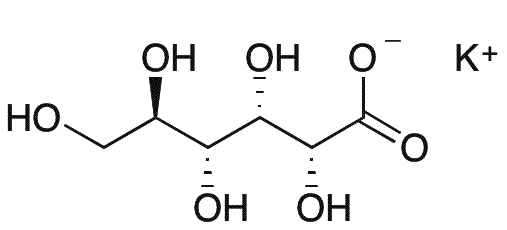Potassium D-gluconate is widely utilized in research focused on:
- Food Industry: Used as a food additive, it helps enhance the flavor and preserve the quality of various food products, making it a popular choice among food manufacturers.
- Pharmaceuticals: This compound serves as a source of potassium in dietary supplements and medications, aiding in the treatment of potassium deficiencies.
- Agriculture: It acts as a nutrient supplement in fertilizers, promoting plant growth and improving crop yields, which is crucial for sustainable farming practices.
- Cosmetics: Employed in skincare formulations, it helps maintain skin hydration and improves overall skin texture, appealing to cosmetic manufacturers aiming for effective products.
- Laboratory Research: Used in various biochemical assays, it helps in studying metabolic processes, making it valuable for researchers in biochemistry and molecular biology.
General Information
Properties
Safety and Regulations
Applications
Potassium D-gluconate is widely utilized in research focused on:
- Food Industry: Used as a food additive, it helps enhance the flavor and preserve the quality of various food products, making it a popular choice among food manufacturers.
- Pharmaceuticals: This compound serves as a source of potassium in dietary supplements and medications, aiding in the treatment of potassium deficiencies.
- Agriculture: It acts as a nutrient supplement in fertilizers, promoting plant growth and improving crop yields, which is crucial for sustainable farming practices.
- Cosmetics: Employed in skincare formulations, it helps maintain skin hydration and improves overall skin texture, appealing to cosmetic manufacturers aiming for effective products.
- Laboratory Research: Used in various biochemical assays, it helps in studying metabolic processes, making it valuable for researchers in biochemistry and molecular biology.
Documents
Safety Data Sheets (SDS)
The SDS provides comprehensive safety information on handling, storage, and disposal of the product.
Product Specification (PS)
The PS provides a comprehensive breakdown of the product’s properties, including chemical composition, physical state, purity, and storage requirements. It also details acceptable quality ranges and the product's intended applications.
Certificates of Analysis (COA)
Search for Certificates of Analysis (COA) by entering the products Lot Number. Lot and Batch Numbers can be found on a product’s label following the words ‘Lot’ or ‘Batch’.
Numéro de catalogue
Numéro de lot/série
Certificates Of Origin (COO)
This COO confirms the country where the product was manufactured, and also details the materials and components used in it and whether it is derived from natural, synthetic, or other specific sources. This certificate may be required for customs, trade, and regulatory compliance.
Numéro de catalogue
Numéro de lot/série
Safety Data Sheets (SDS)
The SDS provides comprehensive safety information on handling, storage, and disposal of the product.
DownloadProduct Specification (PS)
The PS provides a comprehensive breakdown of the product’s properties, including chemical composition, physical state, purity, and storage requirements. It also details acceptable quality ranges and the product's intended applications.
DownloadCertificates of Analysis (COA)
Search for Certificates of Analysis (COA) by entering the products Lot Number. Lot and Batch Numbers can be found on a product’s label following the words ‘Lot’ or ‘Batch’.
Numéro de catalogue
Numéro de lot/série
Certificates Of Origin (COO)
This COO confirms the country where the product was manufactured, and also details the materials and components used in it and whether it is derived from natural, synthetic, or other specific sources. This certificate may be required for customs, trade, and regulatory compliance.


